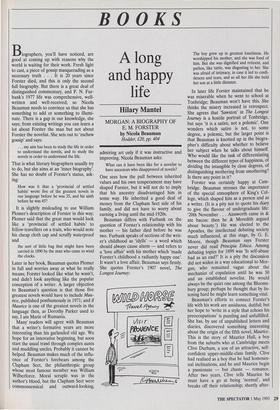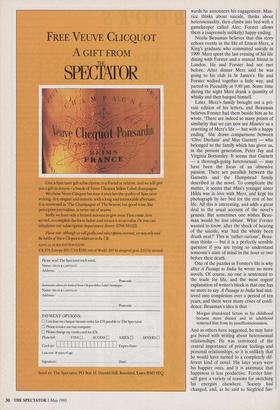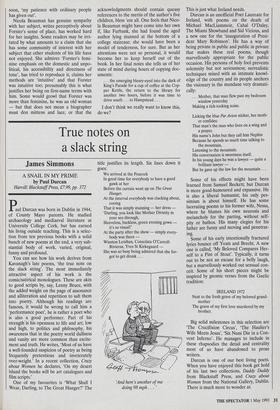BOOKS
A long and happy life
Hilary Mantel
MORGAN: A BIOGRAPHY OF E. M. FORSTER by Nicola Beauman Hodder, f20, pp. 404 Biographers, you'll have noticed, are good at coming up with reasons why the world is waiting for their work. Fresh light to cast, a piece of gossip masquerading as a necessary truth . . . It is 20 years since Forster died, and this is only the second full biography. But there is a great deal of distinguished commentary, and P. N. Fur- bank's 1977 life was comprehensive, well- written and well-received; so Nicola Beauman needs to convince us that she has something to add or something to illumi- nate. There is a gap in our knowledge, she says; from existing writings you can learn a lot about Forster the man but not about Forster the novelist. She sets out to 'eschew gossip' and says: . . . my aim has been to study the life in order to understand the novels, and to study the novels in order to understand the life.
That is what literary biographers usually try to do, but she aims at an 'inner biography'. She has no doubt of Forster's status, ask- ing:
How was it that a 'provincial of settled habits' wrote five of the greatest novels in our language before he was 35, and his sixth before he was 45?
It is slightly misleading to use William Plomer's description of Forster in this way; Plomer said that the great man would look like a 'provincial of settled habits' to fellow-travellers on a train, who would note his cheap cloth cap and scruffy waterproof and
the sort of little bag that might have been carried in 1890 by the man who came to wind the clocks.
Later in her book, Beauman quotes Plomer in full and worries away at what he really means; Forster looked like what he wasn't, and didn't look anything like the popular conception of a writer. A larger objection to Beauman's question is that those five greatest novels would have to include Mau- rice, published posthumously in 1971; and if Maurice is one of the greatest novels in the language then, as Dorothy Parker used to say, I am Marie of Rumania.
Many readers will agree with Beauman that a writer's formative years are more interesting than his garlanded old age. We hope for an innovative beginning, but soon start the usual trawl through complex aunts and muddling uncles. Probably it cannot be helped. Beauman makes much of the influ- ence of Forster's forebears among the Clapham Sect, the philanthropic group whose most famous member was William Wilberforce. Moral scruple was in the author's blood, but the Clapham Sect were commonsensical and outward-looking, admiring art only if it was instructive and improving. Nicola Beauman asks:
What can it have been like for a novelist to have ancestors who disapproved of novels?
One sees how the pull between inherited values and his own temperament may have shaped Forster, but it will not do to imply that his ancestry disadvantaged him in some way. He inherited a good deal of money from the Clapham Sect side of his family, and did not have to worry about earning a living until the mid-1920s.
Beauman differs with Furbank on the question of Forster's relationship with his mother — his father died before he was two. Furbank speaks of sections of the writ- er's childhood as 'idylls' — a word which should always cause alarm — and refers to a 'love affair' with his mother which 'made Forster's childhood a radiantly happy one'. It wasn't a love affair, Beauman says firmly. She quotes Forster's 1907 novel, The Longest Journey:
The boy grew up in greatest loneliness. He worshipped his mother, and she was fond of him. But she was dignified and reticent, and pathos, like tattle, was disgusting to her. She was afraid of intimacy, in case it led to confi- dences and tears, and so all her life she held her son at a little distance.
In later life Forster maintained that he was miserable when he went to school at Tonbridge; Beauman won't have this. She thinks the misery increased in retrospect. She agrees that `Sawston' in The Longest Journey is a hostile portrait of Tonbridge, but says 'it is a satire, not a polemic'. One wonders which satire is not, to some degree, a polemic, but the larger point is that Beauman is knotted up in the biogra- pher's difficulty about whether to believe her subject when he talks about himself. Who would like the task of differentiating between the different types of happiness, of dividing the intangible by close degrees, of distinguishing mothering from smothering? Is there any point in it? Forster was certainly happy at Cam- bridge. Beauman stresses the importance of the special atmosphere of King's Col- lege, which shaped him as a person and as a writer. (It is a pity not to quote his diary to give the flavour of undergraduate life: `20th November . . . Ainsworth came in & ate bacon: then he & Meredith argued about beauty.') He was elected to the Apostles, the intellectual debating society much influenced, at this stage, by G. E. Moore, though Beauman says Forster never did read Principia Ethica. Among debating topics for 1899 was 'Is self-abuse bad as an end?' It is a pity the discussion did not widen in a way educational to Mor- gan, who remained vague about the mechanics of copulation until he was 30 and an established novelist. He would always be the quiet one among the Blooms- bury group; perhaps he thought that by lis- tening hard he might learn something vital.
Beauman's efforts to connect Forster's life with his work are assiduous, dutiful; but her hope to 'write in a style that echoes his preoccupations' is puzzling and unfulfilled. She has, by use of unpublished letters and diaries, discovered something interesting about the origin of the fifth novel, Maurice. This is the story of Maurice Hall, a boy from the suburbs who at Cambridge meets Clive Durham, a son of an attractive, self- confident upper-middle-class family. Clive had realised as a boy that he had homosex- ual inclinations, and he and Maurice begin a passionate — but chaste — romance. After two years, Clive tells Maurice he must have a go at being 'normal', and breaks off their relationship; shortly after- wards he announces his engagement. Mau- rice thinks about suicide, thinks about heterosexuality, then climbs into bed with a gamekeeper called Alec; Forster allows them a (supremely unlikely) happy ending.
Nicola Beauman believes that this story echoes events in the life of Ernest Merz, a King's graduate who committed suicide in 1909. Merz spent the last evening of his life dining with Forster and a mutual friend in London. He and Forster had not met before. After dinner Merz said he was going to his club in St James's. He and Forster walked together a little way, and parted in Piccadilly at 9.40 pm. Some time during the night Merz drank a quantity of whisky and then hanged himself.
Later, Merz's family brought out a pri- vate edition of his letters, and Beauman believes Forster had them beside him as he wrote. 'There are indeed so many points of similarity that we can now see Maurice as a rewriting of Merz's life — but with a happy ending.' She draws comparisons between `Clive Durham' and Max Garnett — who belonged to the family which has given us, in the present generation, Peter Jay and Virginia Bottomley. It seems that Garnett — a thorough-going heterosexual — may have been the focus of an obsessive passion. There are parallels between the Garnetts and the Hampstead family described in the novel. To complicate the matter, it seems that Max's younger sister Hilda was in love with Merz, and kept his photograph by her bed for the rest of her life. All this is interesting, and adds a great deal to the usual account of the novel's genesis. But sometimes one wishes Beau- man would be less obtuse. What Forster wanted to know, after the shock of hearing of the suicide, was 'had the whisky been drunk neat?' This is 'rather curious', Beau- man thinks — but it is a perfectly sensible question if you are trying to understand someone's state of mind in the hour or two before their death.
One of the puzzles in Forster's life is why after A Passage to India he wrote no more novels. Of course, no one is sentenced to the trade for life, and the most cogent explanation of writer's block is that one has no more to say. A Passage to India had stut- tered into completion over a period of ten years, and there were many crises of confi- dence. Beauman's idea is that
Morgan abandoned fiction as his childhood became more distant and as adulthood removed him from its unselfconsciousness.
And as others have suggested, he may have got bored with writing about heterosexual relationships. He was convinced of the central importance of private feelings and personal relationships, so it is unlikely that he would have turned to a completely dif- ferent kind of novel. His later years were his happier ones, and it is axiomatic that happiness is less productive. Forster him- self gave a variety of reasons for switching his energies elsewhere. Society had changed, and, as he said to Siegfried Sas- soon, `my patience with ordinary people has given out'.
Nicola Beauman has genuine sympathy with her subject, writes perceptively about Forster's sense of place, has worked hard for her insights. Some readers may be irri- tated by what amounts to a claim that she has some community of interest with her subject that other students of his life have not enjoyed. She admires `Forster's femi- nine emphasis on the domestic and unpo- litical, his accessibility and directness of tone', has tried to reproduce it, claims her methods are 'intuitive' and that Forster was intuitive too; presumably this is what justifies her being on first-name terms with him. Some would growl that Forster was more than feminine, he was an old woman — but that does not mean a biographer must don mittens and lace, or that the acknowledgments should contain queasy references to the merits of the author's five children, bless 'em all. One feels that Nico- la Beauman might have come into her own if, like Furbank, she had found the aged author lying stunned at the bottom of a college staircase; she would have been a model of tenderness, for sure. But as her attentions were not so personal, it would become her to keep herself out of the book. In her final notes she tells us of her state of mind during hours of copying doc- uments: ... the emerging bleary-eyed into the dark of King's Parade for a cup of coffee at the Cop- per Kettle, the return to the library for another two hours, before it was time to drive south ... to Hampstead .
I don't think we really want to know this, do we?




























































 Previous page
Previous page